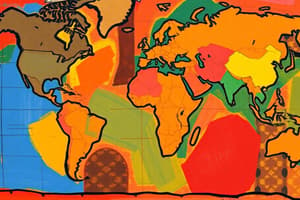Podcast
Questions and Answers
What is the main focus of historiography?
What is the main focus of historiography?
- The study of past events and their causes.
- The memory and perception of collective history.
- The context in which a historical text was written. (correct)
- The collection of historical facts.
How does historiography enhance the study of history?
How does historiography enhance the study of history?
- By providing insight into the historian's context. (correct)
- By simplifying complex historical narratives.
- By promoting a subjective understanding of historical events.
- By collecting more historical documents.
What does the phrase 'no document, no history' imply in positivism?
What does the phrase 'no document, no history' imply in positivism?
- Secondary sources are sufficient for historical narratives.
- All history can be reconstructed from memory.
- Without primary documents, claims about history cannot be validated. (correct)
- History should rely solely on oral tradition.
What role does history play in nation-building?
What role does history play in nation-building?
What aspect is not typically analyzed in historiography?
What aspect is not typically analyzed in historiography?
Which statement about positivism is incorrect?
Which statement about positivism is incorrect?
Why is it important for students of history to understand historiography?
Why is it important for students of history to understand historiography?
Which of the following best describes the relationship between history and historiography?
Which of the following best describes the relationship between history and historiography?
What was the primary method of historical narration used by ancient Filipinos?
What was the primary method of historical narration used by ancient Filipinos?
How did Spanish chroniclers perceive the precolonial period of the Philippines?
How did Spanish chroniclers perceive the precolonial period of the Philippines?
What concept did Filipino historian Zeus Salazar introduce for writing history?
What concept did Filipino historian Zeus Salazar introduce for writing history?
What was the view of early nationalists regarding the precolonial society?
What was the view of early nationalists regarding the precolonial society?
What does the term 'pantayong pananaw' emphasize in the context of Philippine history?
What does the term 'pantayong pananaw' emphasize in the context of Philippine history?
What was one of the main focuses of Annales scholars?
What was one of the main focuses of Annales scholars?
What is a primary source?
What is a primary source?
Which of the following is an example of a primary source?
Which of the following is an example of a primary source?
How can bias in historical research be mitigated?
How can bias in historical research be mitigated?
Which discipline is not typically associated with the Annales approach to history?
Which discipline is not typically associated with the Annales approach to history?
What are secondary sources?
What are secondary sources?
What role do historians play in the representation of the past?
What role do historians play in the representation of the past?
Which type of historical source includes artifacts, letters, and government records?
Which type of historical source includes artifacts, letters, and government records?
How does a historian's subjectivity affect their work?
How does a historian's subjectivity affect their work?
What is the term used for history that includes perspectives of the less prominent social classes?
What is the term used for history that includes perspectives of the less prominent social classes?
Why is historical research still considered scientific despite the lack of absolute objectivity?
Why is historical research still considered scientific despite the lack of absolute objectivity?
What is one of the contributions of the Annales School of History?
What is one of the contributions of the Annales School of History?
What is a primary task of historians when analyzing conflicting historical sources?
What is a primary task of historians when analyzing conflicting historical sources?
Which of the following does NOT contribute to a historian's interpretation of historical facts?
Which of the following does NOT contribute to a historian's interpretation of historical facts?
What distinguishes the Annales School from traditional historical methods?
What distinguishes the Annales School from traditional historical methods?
How do historians validate their historical claims in their writings?
How do historians validate their historical claims in their writings?
What was the intention of lustrados like Jose Rizal and Isabelo de los Reyes when writing history?
What was the intention of lustrados like Jose Rizal and Isabelo de los Reyes when writing history?
What narrative did American historians create regarding Filipinos during the colonization?
What narrative did American historians create regarding Filipinos during the colonization?
What does postcolonial history primarily seek to achieve?
What does postcolonial history primarily seek to achieve?
Which key issue is raised regarding how history is written?
Which key issue is raised regarding how history is written?
What perspective is commonly associated with the portrayal of the Second World War in Philippine history?
What perspective is commonly associated with the portrayal of the Second World War in Philippine history?
What dilemma concerning historical truth is highlighted in the content?
What dilemma concerning historical truth is highlighted in the content?
How did Marcos attempt to convey history in the Philippines during the 1970s?
How did Marcos attempt to convey history in the Philippines during the 1970s?
What is a key focus of postcolonial history?
What is a key focus of postcolonial history?
Study Notes
Historiography
- Historiography is the study of how history is written and understood.
- It examines historical texts, their authors, contexts, methods, and sources.
- It helps students critically analyze historical narratives and understand the historian's perspective.
- It shows how history can be used to legitimize regimes, build national identity, and learn from past mistakes.
Schools of Thought in History Writing
- Positivism: Emphasizes empirical evidence and objective analysis, advocating for "no document, no history."
- Postcolonialism: Challenges colonial perspectives and focuses on reclaiming the narratives of colonized nations.
- Annales School: Explores social history, longer historical periods, and the lives of ordinary people, integrating other disciplines like geography and anthropology.
History and the Historian
- History is always subjective—influenced by the historian's context, perspectives, and biases.
- Historical research requires rigor and methodology to ensure reliable and validated historical claims.
- The historian's job is to interpret historical facts, establish causes, and create a narrative.
Historical Sources
- Primary sources: Created at the same time as the event or subject being studied (e.g., documents, artifacts, eyewitness accounts).
- Secondary sources: Created by authors who use primary sources to analyze a historical topic.
Philippine Historiography
- The precolonial period featured oral traditions and communal narratives.
- Spanish chronicles adopted a bipartite view, portraying a dark precolonial period illuminated by colonization.
- Filipino nationalists challenged this perspective with a tripartite view, emphasizing a golden precolonial age followed by darkness and eventual liberation.
- Zeus Salazar's "pantayong pananaw" promotes a Filipino-centric perspective on history, using accessible language and fostering internal dialogue.
Studying That Suits You
Use AI to generate personalized quizzes and flashcards to suit your learning preferences.
Related Documents
Description
Explore the intricacies of historiography, focusing on how history is written, understood, and interpreted. This quiz delves into various schools of thought, including positivism and postcolonialism, and analyzes the impact of historical narratives on society. Understand the subjective nature of history and the role of the historian's context in shaping historical narratives.




